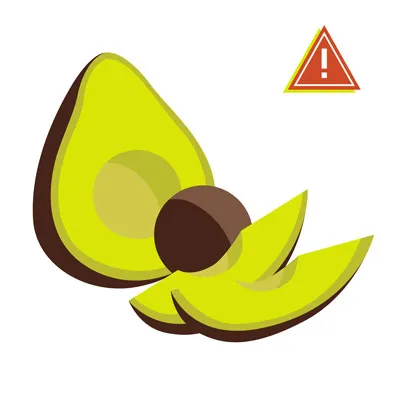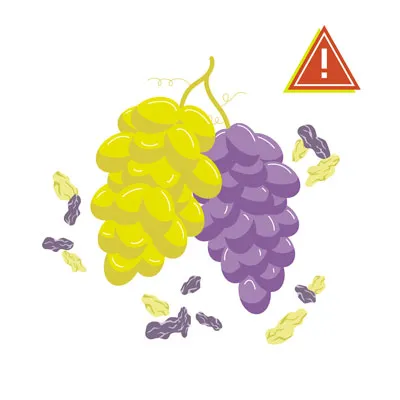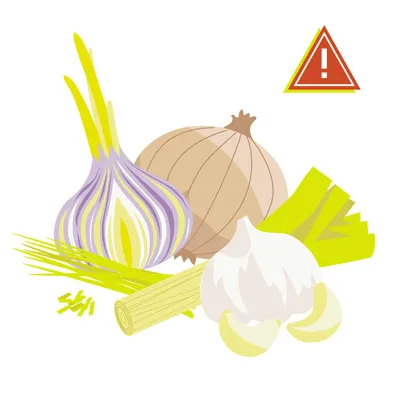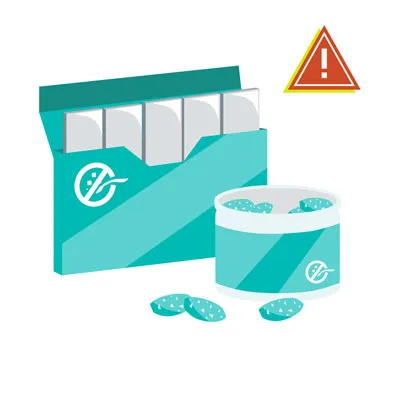As loving pet parents, we always want to share our lives, and often our food, with our furry companions. However, a common misconception is that if a food is safe for humans, it’s safe for dogs. The reality is quite different: some human foods can be your dog’s best friend or their worst enemy, with certain common household items proving highly toxic even in small amounts. This guide will help you navigate What Foods Can You Not Feed Your Dog, ensuring your beloved canine stays healthy and safe.
Pet poisonings are a significant concern for dog owners, with over 401,500 incidents reported annually in the United States alone. While not all are food-related, common human foods are a major contributor to these alarming statistics. Understanding which foods to avoid and which are safe is crucial for protecting your pet. This comprehensive “cheat sheet” is designed to equip you with the essential knowledge needed to keep your dog out of harm’s way and provides insights into what should I feed a puppy with diarrhea if digestive issues arise.
Why Certain Foods Are Toxic to Dogs
The question of “what can dogs eat and not eat” stems from fundamental differences in canine digestion and metabolism compared to humans. Dogs process various substances uniquely. For instance, dogs metabolize theobromine and caffeine found in chocolate much slower than humans, allowing these compounds to build up rapidly in their system and potentially become fatal.
Another example is cherries; while humans can easily digest them, the cyanide in their pits, stems, and leaves can be problematic in large quantities for dogs. Moreover, cherry pits are difficult for dogs to digest and can lead to diarrhea. Food toxicity can also vary based on a dog’s size, breed, and existing health conditions, making it vital to consult your veterinarian with any questions about foods your dog should avoid.
A Comprehensive List of Common Foods Dogs Cannot Eat
Many everyday household foods pose a serious, often toxic, threat to dogs. While this list is not exhaustive, it highlights some of the most common and dangerous items your dog should never consume, including alcohol, avocados, macadamia nuts, grapes and raisins, xylitol, and chocolate.
1. Alcohol
Due to their smaller size, alcohol has a much more deadly effect on dogs than on humans. Even minimal amounts can cause harm, with the risk increasing significantly for smaller pets. Symptoms of alcohol poisoning in dogs mirror those in people, including vomiting, breathing difficulties, coma, and even death.
2. Apple, Apricot, Cherry, and Plum Seeds/Pits
While the fleshy parts of apples are safe for dogs, the core and seeds are not. Apple seeds contain cyanide, and though small amounts may not be immediately harmful, it’s best to remove the core and seeds entirely. Similarly, apricot, cherry, peach, and plum seeds and pits also contain cyanide, which can lead to severe symptoms such as vomiting, an irregular and rapid heartbeat, seizures, coma, and ultimately, death. This toxicity impairs the red blood cells’ ability to carry oxygen effectively.
3. Avocado
Avocados are generally not a good food choice for dogs. While a specific instance of myocardial damage in two South African dogs after avocado consumption hasn’t been widely replicated, avocados are known to cause issues in other mammal species. Furthermore, an intact avocado pit can cause a dangerous obstruction in a dog’s gastrointestinal tract, making it safest to avoid this fruit altogether.
 Avocado, sliced in half, showing the pit.
Avocado, sliced in half, showing the pit.
4. Broccoli
Broccoli contains isothiocyanates, which can be detrimental to pets in very large quantities. While small, occasional amounts might be acceptable, it’s advisable to opt for other healthier alternatives given the potential risks. Additionally, broccoli stalks can pose a choking hazard for dogs.
5. Caffeine and Coffee Grounds
Caffeine contains methylxanthines, compounds that can cause potentially fatal symptoms in dogs, including diarrhea, vomiting, seizures, and an irregular heartbeat. Accidental ingestion of coffee grounds or highly caffeinated drinks can cause a dog’s heart to race, leading to tremors, arrhythmia, difficulty breathing, and other severe symptoms.
6. Fatty Cuts of Meat (Chicken/Turkey Skin, Ham)
Fatty cuts of meat, such as chicken or turkey skin and ham, should be discarded rather than offered as treats to pets. Their high-fat content can trigger acute pancreatitis, a life-threatening illness with serious complications. It’s also crucial to avoid turkey and chicken bones, as they can splinter, causing internal obstructions or puncturing the stomach or intestines, potentially leading to fatal abdominal infections.
7. Chocolate
Chocolate toxicity is a leading cause of pet poisoning, especially during holidays. Dogs should never consume any chocolate product because it contains theobromine, a lethal component. The darker the chocolate, the higher its theobromine content. Chocolate also contains caffeine, and some sugar-free varieties may include xylitol, which is also highly toxic to dogs. Dogs and cats struggle to metabolize chocolate effectively compared to humans. Dark chocolate and baker’s chocolate are the most dangerous, but any type can be problematic. Symptoms range from hyperactivity, vomiting, diarrhea, and pancreatitis to abnormal heart rhythms and seizures. Immediate veterinary attention is required if your dog ingests any amount of chocolate.
 Chocolate bar with a few pieces broken off next to chocolate chips.
Chocolate bar with a few pieces broken off next to chocolate chips.
8. Grapes and Raisins
Grapes and raisins are exceptionally dangerous for dogs and can cause severe problems, including kidney failure. The tartaric acid present in these fruits is toxic to a dog’s kidneys, and even a few bites can wreak havoc. Signs of grape or raisin poisoning include vomiting, diarrhea, loss of appetite, changes in urination volume, or complete cessation of urine production.
 A bunch of red grapes on the vine, next to a small pile of raisins.
A bunch of red grapes on the vine, next to a small pile of raisins.
9. Macadamia Nuts, Almonds, and Pistachios
Macadamia nuts are toxic to dogs, causing painful symptoms such as weakness, overheating, and vomiting. While the exact mechanism of toxicity remains somewhat mysterious, as few as six nuts can cause severe poisoning in a small dog. Other nuts, like pistachios and almonds, are primarily choking hazards, especially if flavored or spiced.
10. Milk and Dairy Products
The suitability of milk and dairy products for dogs varies individually. Some dogs can consume them without issue, while others are lactose intolerant or allergic, experiencing diarrhea and gas. High sugar and fat content make ice cream an unsuitable treat; healthier alternatives like frozen fruits are preferable. Cheese can be given in small, low-fat quantities as a treat.
11. Mushrooms
It’s safest to avoid feeding your dog mushrooms, as they can contain various toxins that may lead to kidney and liver failure, vomiting, diarrhea, hallucinations, and red blood cell damage. While washed, white mushrooms from a grocery store might seem safe, choosing a different treat is a safer bet.
12. Nutmeg and Cinnamon
Nutmeg should never be fed to dogs, as it can cause hallucinations and severe vomiting due to the compound myristicin. Its effects are more pronounced in high doses or in smaller dogs. Cinnamon, while not toxic, can irritate a dog’s mouth and potentially lead to low blood sugar, with serious health implications.
13. Onions, Garlic, Chives, and Leeks
Members of the allium family, including onions, garlic, chives, and leeks, are unsafe for dogs. These plants contain sulfoxides and disulfides, which can damage red blood cells and induce anemia in both dogs and cats. Onion and garlic powders are often hidden in prepared foods, so it’s essential to check labels carefully. All allium plants can cause potentially fatal anemia, with certain Japanese breeds like Akitas and Shiba Inus being particularly sensitive.
 Assortment of allium vegetables including onions, garlic, and chives on a wooden cutting board.
Assortment of allium vegetables including onions, garlic, and chives on a wooden cutting board.
14. Salt
Excessive salt intake can disrupt the fluid balance in a dog’s cells, leading to tremors, seizures, diarrhea, or even coma. Avoid giving your dog salty snacks like potato chips or even letting them ingest rock salt or homemade play dough.
15. Spicy Food
Spicy foods are a definite no-go for dogs. They can cause vomiting, stomach ulcers, or diarrhea, leading to discomfort for your pet and potentially expensive emergency vet visits.
16. Sugar-Free Gum and Candy (Xylitol)
Xylitol, an artificial sweetener found in many sugar-free human foods like gum, candy, and baked goods, is highly toxic to dogs. It can cause a rapid and dangerous drop in blood sugar, leading to weakness, seizures, and even liver failure. Cases of xylitol poisoning are on the rise; as little as five pieces of gum can be fatal to a 65-pound dog.
 Various sugar-free candies and chewing gums in their wrappers.
Various sugar-free candies and chewing gums in their wrappers.
17. Tomatoes and Raw Potatoes
These foods are a bit of a mixed bag. Ripe red tomatoes are generally safe, but the green parts of the tomato plant and unripe green tomatoes contain solanine, which is toxic to dogs. Similarly, baked or boiled potatoes without additives are safe in small quantities, but raw potatoes also contain solanine and should be avoided.
18. Tobacco
Tobacco and nicotine-containing products are extremely dangerous for dogs. Exposure can cause symptoms such as vomiting, diarrhea, rapid or labored breathing, agitation, abnormal heart rate, wobbliness, muscle weakness, high or low blood pressure, seizures, and tremors. More significant exposure can lead to blue gums, coma, and even death. If your dog ingests tobacco, immediate veterinary attention is critical.
19. Yeast and Raw Dough
Yeast and raw dough pose multiple threats to dogs. The raw dough can expand in the stomach, causing severe pain and potentially life-threatening gastric torsion or rupture. Additionally, the yeast and sugar in raw dough ferment, producing alcohol, which can lead to alcohol toxicity that requires immediate medical intervention and can be fatal.
20. Raw Meat
Never feed your dog raw or undercooked meat. Raw meat can harbor harmful bacteria like Salmonella or E. coli, which can sicken dogs just as they do humans. Furthermore, bones in raw meat can be a serious choking hazard for your dog.
21. Rhubarb
Rhubarb, often used in desserts, is not safe for pets. Its leaves contain soluble calcium oxalate crystals that, if eaten in sufficient quantities, can bind with calcium in the body, causing a dangerous drop in calcium levels and potentially leading to renal failure. Symptoms include tremors, weakness, drooling, bloody urine, altered thirst and urination, and vomiting.
22. Star Fruit
Like rhubarb, star fruit also contains soluble calcium oxalate crystals and should not be given to your dog.
23. Flavored and Seltzer Water
It is always best to give your dog fresh, clean water over anything flavored or carbonated. Flavored and seltzer waters can contain added sugars or salts that are dangerous for pups. While plain seltzer water might be okay in small, urgent situations, it can cause gas and bloating. Stick to plain water for optimal hydration.
Safe Foods for Dogs: A Healthier Alternative
While the list of foods to avoid is extensive, many human foods are perfectly safe and even beneficial for dogs. Some popular and healthy options include dehydrated chicken or beef (in very small quantities), apples (without core or seeds), green beans, and carrots.
1. Apples, Oranges, and Bananas
The fleshy parts of apples, without the core and seeds, are perfectly safe and healthy treats. Oranges are safe in small amounts, and bananas (peeled and in moderation) can also be a tasty and healthy snack.
2. Blueberries and Blackberries
Blueberries are excellent treats, packed with antioxidants, fiber, phytochemicals, and vitamin C, all beneficial for your dog’s health.
3. Cantaloupe, Mango, Peaches, Pears, Pineapples, and Watermelon
Many fruits can be safely enjoyed by dogs. Cantaloupe is a great choice. Watermelon, with rinds and seeds removed, is a refreshing treat, especially on a warm day due to its high water content. Mangoes, peaches, pears, and pineapples are also safe in moderation, provided seeds, pits, and cores are removed.
4. Carrots, Cucumber, and Celery
These “three C’s” are excellent, low-calorie options, particularly for overweight dogs. Bite-sized carrot pieces offer a satisfying crunch, celery can help with bad breath, and cucumber slices provide vitamins and minerals with minimal carbs and fats.
5. Cheese
Small quantities of lower-fat cheese can be an acceptable treat for dogs who are not lactose intolerant. Always check with your vet for the best type and portion.
6. Eggs
Fully cooked eggs are a nutritious and enjoyable treat. Scrambled eggs can even help soothe an upset stomach and provide a good source of protein.
7. Peanuts, Peanut Butter, and Cashews
Unseasoned, unsalted peanuts and cashews are safe in small quantities due to their high-fat content. Unsalted, xylitol-free peanut butter is also a popular, high-protein treat in moderation.
8. Popcorn and Corn
Air-popped, unsalted, and unbuttered popcorn can be a fun treat. Ensure all unpopped kernels are removed to prevent choking. Similarly, corn (removed from the cob, without butter, salt, or spices) is acceptable.
9. Coconut and Honey
Small amounts of coconut (including coconut milk and oil) are generally fine for dogs and contain lauric acid, which may help with allergies. However, fresh coconut or coconut milk might upset some dogs’ stomachs. Honey in moderation is also safe, offering various vitamins and minerals.
10. Shrimp and Fish
Plain, fully cooked shrimp, with shells, heads, tails, and legs removed, is a good option. Cooked, boneless fish like salmon and sardines are also permissible, ideally no more than twice a week. Plain, canned tuna (packed in water) is safe in moderation.
11. Turkey
Plain, cooked turkey meat, with skin, fat, and bones removed, is a healthy and safe source of protein for dogs. Avoid any seasoned or salted turkey.
12. Grains, Wheat, and Quinoa
Small amounts of wheat, other grains, and quinoa (which is healthier than many fillers) are generally fine. Monitor for any allergic reactions.
13. Green Beans
Many dogs enjoy green beans, whether raw, steamed, or from a can. They are safe, tasty, and healthy. Ensure they are plain, unseasoned, and cut into bite-sized pieces to prevent choking.
What Dogs Are Most at Risk if They Consume Toxic Foods?
While all dogs should avoid toxic foods, certain groups are at higher risk:
- Small breeds vs. large breeds: Smaller dogs are more vulnerable due to their lower body weight, especially with substances like chocolate.
- Puppies: Young dogs have less developed digestive and immune systems, increasing their risk from certain substances.
- Elderly dogs: Older dogs may be at higher risk due to existing health conditions.
- Dogs with pre-existing conditions: Conditions like diabetes or kidney disease can put a dog at greater risk.
How to Prevent Dogs from Eating Toxic Foods
Accidents happen, but proactive measures can significantly minimize the risk of your dog ingesting unsafe human food.
1. Store Foods Out of Reach
Ensure all toxic foods are stored on high shelves or in locked cabinets inaccessible to your dog.
2. Avoid Feeding from Your Plate
Resist the urge to feed your dog from your plate or while cooking. It’s safest to only give treats specifically formulated for dogs.
3. Educate Family Members and Guests
Inform everyone in your household, including children and guests, that no human food should be given to your dog, no matter how much they beg.
4. Be Careful During Holidays
Exercise extra caution during holidays when kitchens are often busy, and many tempting foods are present. Keep emergency veterinary contact information and poison control numbers readily available.
What to Do if Your Dog Eats Something Toxic
If your dog consumes a toxic food, immediate action is crucial. Familiarize yourself with common symptoms of food toxicity, which vary depending on the ingested substance but can include listlessness, distress, pain, vomiting, or bloody stools. Sometimes, a dog’s stomach may become bloated and hard to the touch, a painful condition that can lead to rupture if untreated.
If you observe any of these symptoms:
- Contact your veterinarian or poison control immediately. Timeliness is vital for successful treatment and shorter hospitalization.
- Be prepared with all relevant information, including the type and amount of food eaten, and the time of ingestion.
- Avoid home remedies unless explicitly advised by your veterinarian, as remedies vary, and even inducing vomiting can be harmful in certain situations.
Dog Care Story: Helping You Keep Your Dog Healthy
Navigating the world of household toxins and dangerous foods can be challenging, especially since dogs aren’t always discerning eaters. By following this guide and remaining vigilant, you can significantly protect your dog from harmful foods.
Remember, there are plenty of safe and healthy foods your dog can enjoy! Discover which ones your dog loves and offer them as rewarding treats. If you ever have doubts about a particular food, always consult your veterinarian for guidance.
